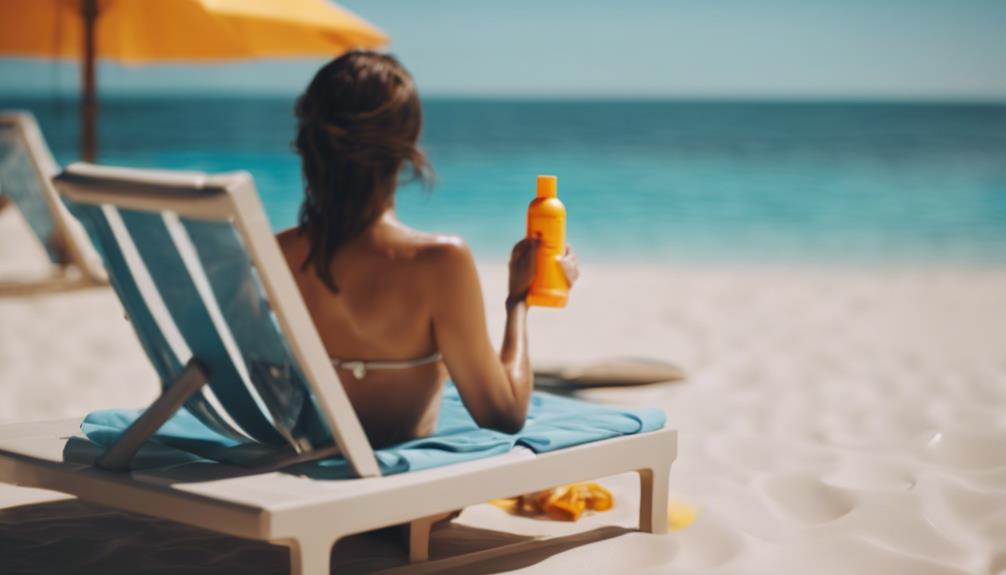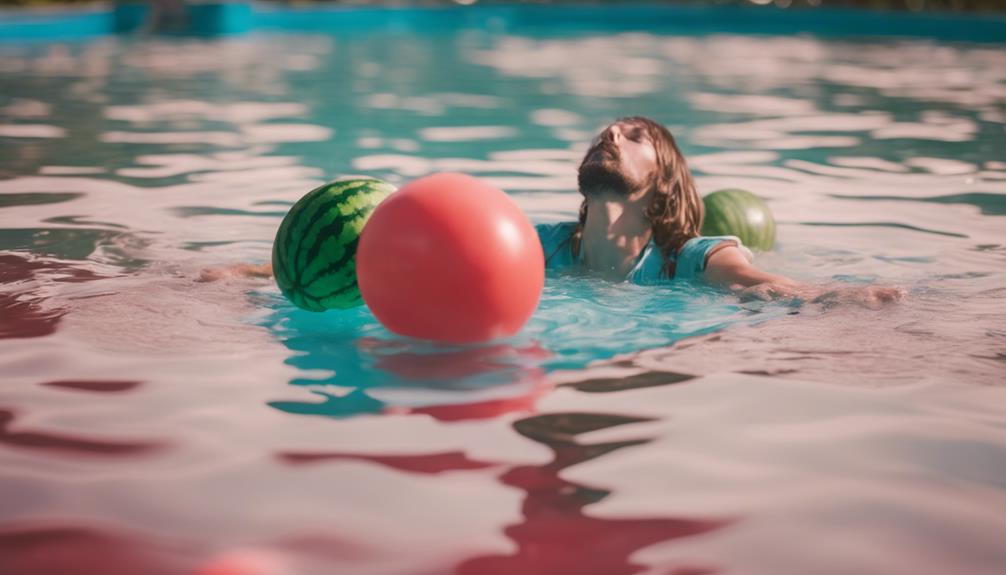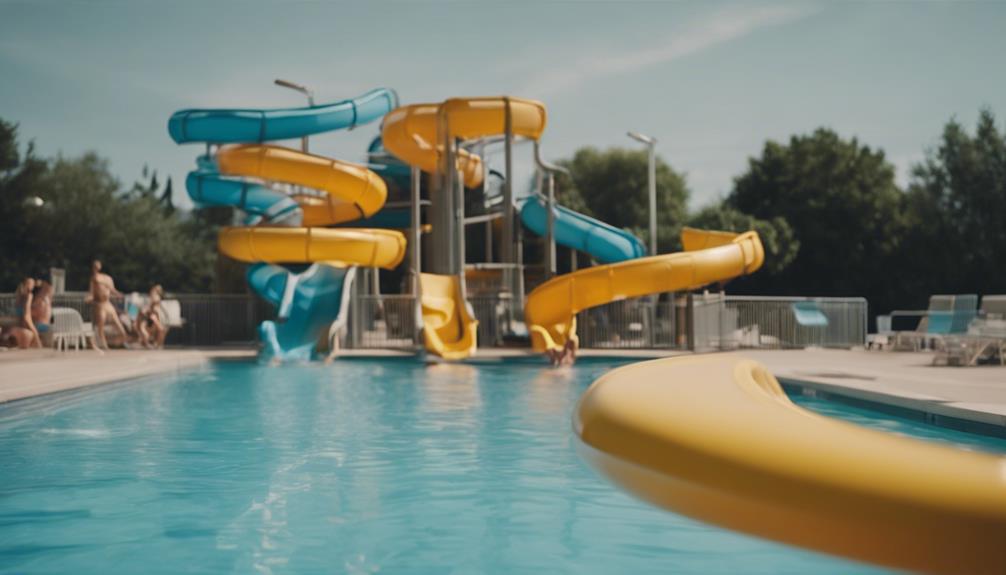Summer swimming pool myths debunked expose the truth behind common misconceptions. Contrary to popular belief, eating before swimming does not heighten the risk of drowning. While sunscreens are important, reapplication is necessary for protection. Understanding sunburn prevention methods is crucial for skin health. Rinsing off before entering a pool is essential to maintaining a clean and safe environment. Additionally, myths about buoyancy and floating are cleared up by knowing how body composition affects flotation. Revealing these myths guarantees a safe and enjoyable time by the pool.
Key Takeaways
- Eating before swimming does not cause drowning.
- There is no need to wait 30 minutes after eating to swim.
- Sunscreen should be reapplied while swimming.
- Buoyancy is influenced by body composition, not just fat.
- Showering before swimming enhances pool safety.
Eating Before Swimming and Drowning
Contrary to popular belief, the notion that eating before swimming can cause drowning is a common misconception that lacks scientific basis. The idea that waiting 30 minutes after eating before swimming is necessary to prevent drowning is a myth.
While digestion does divert blood flow from muscles to the gut, there is no evidence to suggest that it leads to drowning. However, swimming after eating may cause discomfort due to stomach muscle strain.
It is advisable to opt for light snacks with simple carbohydrates before swimming, as there is no specific time limit to wait before entering the water. Ultimately, the focus should be on personal comfort and avoiding any potential stomach-related issues while swimming.
Sunscreen Tips for Swimming
The importance of proper sunscreen application while swimming cannot be overstated, especially considering the increased risk of sunburn and skin damage when exposed to water and sunlight.
Submerging in water intensifies the sun's harmful UV rays, doubling the risk of sunburn. It is essential to reapply sunscreen often, especially when swimming, to guarantee adequate protection. Investing in waterproof sunscreen with at least 30 SPF is recommended to maintain effectiveness in water.
The reflective nature of sun radiation off water further heightens the risk of skin damage, emphasizing the necessity of thorough sun protection measures. By following these sunscreen tips for swimming, individuals can help safeguard their skin against the harmful effects of prolonged sun exposure during aquatic activities.
Sunburn Facts and Prevention

Sunburn facts and prevention are essential components of skin protection strategies for individuals exposed to sunlight.
Sunburn Facts and Prevention:
- UV Exposure: Prolonged sun exposure can lead to sunburn, damaging the skin's DNA.
- Symptoms: Redness, pain, and peeling are common symptoms of sunburn.
- Prevention: Apply sunscreen with SPF 30 or higher, wear protective clothing, and seek shade during peak sun hours.
- Treatment: Cool baths, moisturizers, and aloe vera can help alleviate sunburn discomfort.
Importance of Rinsing Off
After understanding the risks of sun exposure and the importance of preventing sunburn, it is essential to recognize the significance of rinsing off before swimming to maintain a safe and healthy pool environment.
Over 70% of people do not rinse off before entering a pool, mistakenly believing that chlorine can kill all bodily fluids. However, bodily fluids like sweat, oils, and personal care products can react with chlorine, forming harmful substances.
Showering before swimming helps remove these contaminants, reducing the likelihood of chemical reactions and potential health risks for swimmers. This practice is not only important for personal hygiene but also contributes to a cleaner and safer pool environment for everyone.
Myths About Buoyancy and Floating

Understanding the dynamics of buoyancy and floating in water is essential for dispelling common misconceptions and myths surrounding this topic. When it comes to buoyancy and floating, several factors come into play that influence an individual's ability to stay afloat in water:
- Body type and genetic factors play a significant role in determining buoyancy.
- While fat tends to float, variations in body fat levels can impact buoyancy.
- The density of bones and muscles can affect how easily one floats in water.
- Lung size also contributes to how high or low the body floats in the water.
Frequently Asked Questions
Can I Swim Right After Eating Without Risk of Drowning?
Swimming right after eating does not pose a risk of drowning. While digestion diverts blood flow, it does not lead to drowning. Waiting is not necessary, but discomfort may occur due to stomach strain. Opt for light snacks with simple carbohydrates before swimming.
How Often Should Sunscreen Be Reapplied While Swimming?
While swimming, sunscreen should be reapplied every two hours to maintain protection from harmful UV rays. Submerging in water increases sunscreen's need due to intensified sun exposure. Waterproof sunscreen with 30 SPF is recommended.
Does Sunburn Turn Into a Tan When Skin Is Wet?
Sunburn does not turn into a tan when skin is wet. Sunburn is a result of DNA damage from sun exposure, and wet skin does not magically transform into a tan. Applying sunscreen of SPF 25 or higher prevents sunburn.
Is Rinsing off Before Swimming Necessary for Everyone?
Rinsing off before swimming is essential for everyone. Over 70% of swimmers skip this step, risking chemical reactions from bodily fluids in pools. Showering before entering removes harmful substances, promoting a safer swimming experience for all.
Can Body Composition Affect Floating Ability in Water?
Body composition greatly impacts floating ability in water. Factors like fat distribution, bone density, muscle mass, and lung size influence buoyancy. While fat tends to float, denser bones and muscles can affect floating. Individual characteristics determine one's ability to float effectively.
Conclusion
To sum up, debunking common myths surrounding summer swimming pool practices is essential for ensuring a safe and enjoyable aquatic experience.
As the saying goes, 'knowledge is power,' and by arming ourselves with accurate information, we can make informed choices that enhance our time in the water.
So remember, understanding the realities behind pool etiquette and safety measures will not only dispel misconceptions but also promote a fulfilling and worry-free swimming experience.










